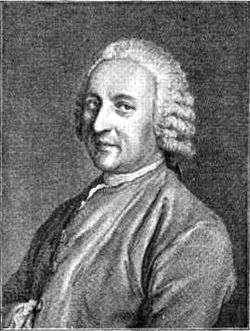Théodore Tronchin
| Théodore Tronchin | |
|---|---|
 Portrait of Doctor Théodore Tronchin (1709-1781), in Geneva by René Gaillard in 1785, from a work by Jean-Etienne Liotard | |
| Born |
24 June 1703 Geneva, Republic of Geneva |
| Died |
30 November 1781 Paris |
| Nationality | Genevan |
| Alma mater | University of Cambridge |
| Scientific career | |
| Fields | Medicine |
Théodore Tronchin (24 June 1709 – 30 November 1781) was a Genevan physician.
Life
A native of Geneva, he studied initially at the University of Cambridge, then transferred to the University of Leiden, where he was a pupil of Herman Boerhaave (1668–1738). In 1730 he obtained his medical doctorate, and subsequently practiced medicine in Amsterdam. In the early 1750s he returned to Geneva, where he received the title of Professor Emeritus of Medicine, and later moved to Paris, where he opened a medical practice in 1766.
Tronchin was an influential 18th-century physician, whose popularity spread amongst European royalty and the upper classes. He was a good friend to several illustrious men, including Voltaire, Rousseau, and Diderot.[1] In 1762 Tronchin was elected a Fellow of the Royal Society and in 1779 a foreign member of the Royal Swedish Academy of Sciences. Tronchin is mentioned in passing as a great physician in the Marquis de Sade's "Philosophy in the Bedroom".
Views
He was a major proponent of inoculation for smallpox, and was responsible for the inoculation of several thousand patients in Switzerland, France and the Netherlands.
He was distrustful of traditional medical practices such as bloodletting and purging, and was an advocate of a simple and natural hygiene that stressed fresh air, diet and exercise. He was scornful of a sedentary lifestyle and excessive sleep, and dedicated several hours of the week to medical assistance for the poor.
Works
Tronchin's written works were few, although he did publish a treatise titled "De colica pictonum", a work that explained the cause of Poitou colic due to lead poisoning. He also wrote part of the article "Innoculation" for Diderot's Encyclopédie (1751–1772).
References
- This article incorporates information based on a translation of an equivalent article at the French Wikipedia.
- Heirs of Hippocrates No. 899, Theodore Tronchin